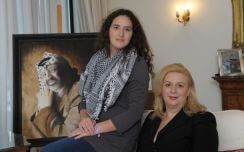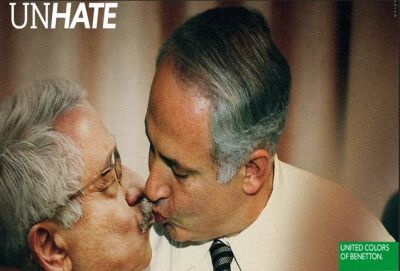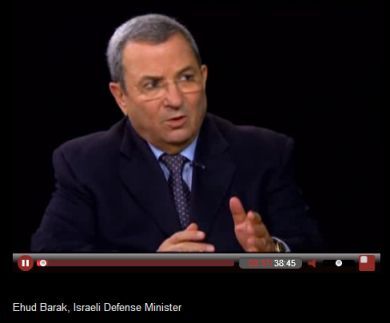 Everything you need to know about today’s coverage of Israel and the Mideast.
Everything you need to know about today’s coverage of Israel and the Mideast.
Ehud Barak’s in hot water over Iranian nukes, Suha Arafat trots out her daughter for a charm offensive, and what’s with Benetton’s new ad campaign?
Iranian Atomic Urgency
• Wow. The Times of London reports that members of Iran’s Revolutionary Guards are running drugs on a global scale to undermine the West.
“There are several commanders involved in smuggling narcotics. Raw opium or morphine is smuggled in from Afghanistan and developed in labs inside Iran,” said Mr Haghpanah.
“They work with criminal gangs to move it overseas. They have their own ships, aircraft and haulage companies, everything needed for import and export. Their power is limitless.”
During a decade at the IRGC before he fled Iran last year, Mr Haghpanah’s investigations routinely uncovered connections between Iranian commanders and the criminal underworld . . .
Those who fall outside the IRGC’s protection are dealt with ruthlessly. In cities such as Mashhad, local authorities have begun mass, secret executions to wipe out a chronic drug problem. Most come from poor, rural backgrounds. They are hardly missed, and their executions reinforce the zero-tolerance image Tehran wishes to project. Trumped-up drugs charges have also been used to jail opposition supporters.
• Ehud Barak raised a stink when he told Charlie Rose that if he were Iranian, he’d want a nuclear bomb too. The defense minister insists he was only speaking hypothetically. Watch the video and judge for yourself.
• Israel and neighboring Arab states are getting together for nuclear talks at an IAEA forum later this month. Reuters says there’s no word if the 200 lb gorilla Iran will attend. Stay tuned . . .
• Eli Lake looks at the electronic warfare Israel might deploy against Iran.
• The Iranians say this week’s blast happened while they were working on a weapon capable of giving Israel “a strong punch in the mouth.” I like this NY Times understatement:
The net effect seemed to deepen, rather than clarify, the questions behind the explosion at the base in Bidganeh, about 25 miles from Tehran, which Iranian authorities have insisted was an accident.
Peace Process
 • The PLO offers to temporarily suspend its statehood push if Israel and the US resume their cash transfers. Haaretz describes a truly bizarre diplomatic dance:
• The PLO offers to temporarily suspend its statehood push if Israel and the US resume their cash transfers. Haaretz describes a truly bizarre diplomatic dance:
. . . the PA plans to complete the process of trying to get full UN membership for Palestine recognized by the Security Council. PA President Mahmoud Abbas is expected to ask for a vote by the end of December, although the move is doomed to defeat. Even if the Palestinians muster enough votes, the United States will veto it.
Other than that, however, the Palestinians are prepared to suspend their efforts to achieve full membership in such agencies as the World Health Organization and the World Trade Organization, the diplomat said. Nor will they ask the General Assembly to upgrade their observer status to non-member observer state.
Money talks.
• Gaza terrorists are getting hands-on training in Iran on how to use advanced Kornet and Fagot anti-tank missiles they’re stockpiling. More at the JPost.
• Here’s a naive op-ed in the Christian Science Monitor. The European economic integration that Murray Cohen holds up as a model for the Mideast is collapsing before our very eyes.
As for peace, Western Europe got along after WW2 because England, France and West Germany all agreed that peace, friendship and cooperation were the only way forward. I don’t see that the Palestinians rate those values highly.
• Israel HaYom’s David Keyes admits he was wrong about Hamas.
• Elliott Abrams insists that Palestinian diplomacy’s “lost at sea.”
• A Sydney Morning Herald op-ed urges the world “to promote an environment that makes a negotiated two-state solution more likely.”
• Trudy Rubin’s disappointed nobody’s interested in peace talks.
Arab Spring
• Suha Arafat’s charmlessly offensive charm offensive continues with an interview on Egyptian TV. I slammed AFP’s complicity with this family portrait. Yes, Mrs. Arafat uses her 16-year-old daughter, Zahwa, to tug heartstrings . . .

• The Arab League finally bares its teeth. Reuters says it gave Bashar Assad “three days to implement a road map agreed this month to end the bloodshed and allow in observers,” or else, uh:
they did not say what would happen if Syria failed to comply.
• According to Business Week (via DG at Daled Amos), the Syrian regime can’t afford to buy off the populace with subsidies and civil service largesse much longer.
“They’re spending more money and getting less income,” said Chris Phillips, an analyst at the Economist Intelligence Unit in London. “All of this is exacerbated by sanctions, and allies like the Persian Gulf countries are not providing any financial assistance, as they would have in the past. This position is economically unsustainable.”
• France withdrew its ambassador from Damascus and joined Britain and Germany in a call for UN sanctions against Syria.
• Tony Karon comments on the strategic chess match Syria’s neighbors are engaged in.
 • According to Time, the US is most concerned about surface to air missiles, but some experts believe many of the SAMs are outdated or are missing parts. Libyans are more concerned about land mines and rifles that could be used for a new insurgency.
• According to Time, the US is most concerned about surface to air missiles, but some experts believe many of the SAMs are outdated or are missing parts. Libyans are more concerned about land mines and rifles that could be used for a new insurgency.
• The Arab Spring sprung on Kuwait, where protesters stormed the parliament building. The Lede rounds up the videos, links and tweets.
• Egyptian security forces are more and more confrontational with peaceful protests. So protesters in one Nile River port city escalated matters. McClatchy News describes what happened in Damietta:
One person was killed and a dozen injured on Sunday when Egyptian troops armed with assault rifles opened fire on about 50 demonstrators who’d camped overnight to demand that a fertilizer factory stop dumping chemical waste into the waters of this port town.
In the days since, protesters have paralyzed this city’s busy port, turning away hundreds of cargo trucks and vowing not to lift the blockade, even though the Egyptian government has said it has suspended the factory’s operations while its toxic effects are studied. The protesters also have blocked access to the security forces’ barracks nearby.
• Because of conflicting priorities and lack of funds, efforts to find and secure Libyan arms remain bogged down.
Rest O’ the Roundup
• The LA Times picks up on Israeli suspicions that Press TV reporter Ibrahim Hussein is a foreign agent. Interesting background, this:
Yet there is a sort-of precedent for Eldad’s position.
During Israel’s military assault in Gaza, known locally as Operation Cast Lead, two journalists said to work for Iranian media were arrested by Israeli authorities — not so much for working for an Iranian outlet but for violating the tight censorship imposed by reporting that the army had begun its ground offensive in real time. The two were picked up after being “outed” on Israeli television by a local veteran reporter.
They were charged with transmitting information to the enemy in a time of war, but their jail sentence was overturned by the Supreme Court.
• No, Abbas hasn’t embraced Israel yet. Here’s my, uh, tongue in cheek reaction to this Benetton ad that might appear in a paper near you.

• Mapping out 150,000 Jewish graves on the Mount of Olives is a story. Thank goodness AP included some historical background. It would’ve been a, uh, grave error, not to tell readers this:
For the next 19 years Jordan controlled the cemetery, paving over part of it to build a road, using gravestones to pave paths in a nearby military camp and abandoning the rest to disrepair.
• BBC’s Reya El-Salahi is visiting Israel. She bills herself as half-Jewish, half Arab by virtue of her parents’ “unconventional relationship” to give some sizzle to her blog post and video. I was simply intrigued by her general impression of Israel:
. . . many of my pre-conceived notions were turned on their head.
For example, I had arrived assuming my darker skin would leave me standing out like a sore thumb. In fact, everywhere I went I found people who looked just like me. The migration of Jews from all over the world means Israel is, visually, a far more mixed society than I had ever imagined.
Another example of my naivety, perhaps – I was shocked the first time I saw a tram pull into a Jerusalem station with a sign flashing in English, Hebrew and Arabic. And no one, except me, batted an eyelid as orthodox Jews with hats and curls disembarked alongside women in hijabs and girls in mini skirts.
Only in Israel is normalcy newsworthy.
• Two scandals in one day for the BBC, poor things.
First, the BBC Trust counted 15 breaches of guidelines when editors purchased documentaries about Egypt and Malaysia from a company that was promoting those governments. Then, the Daily Mail shone a spotlight on the Beeb’s bloated bureacracy.
I couldn’t resist sticking a knife in. I blogged the scandals, with more background links.
(Photo of money via Flickr/chedder)


